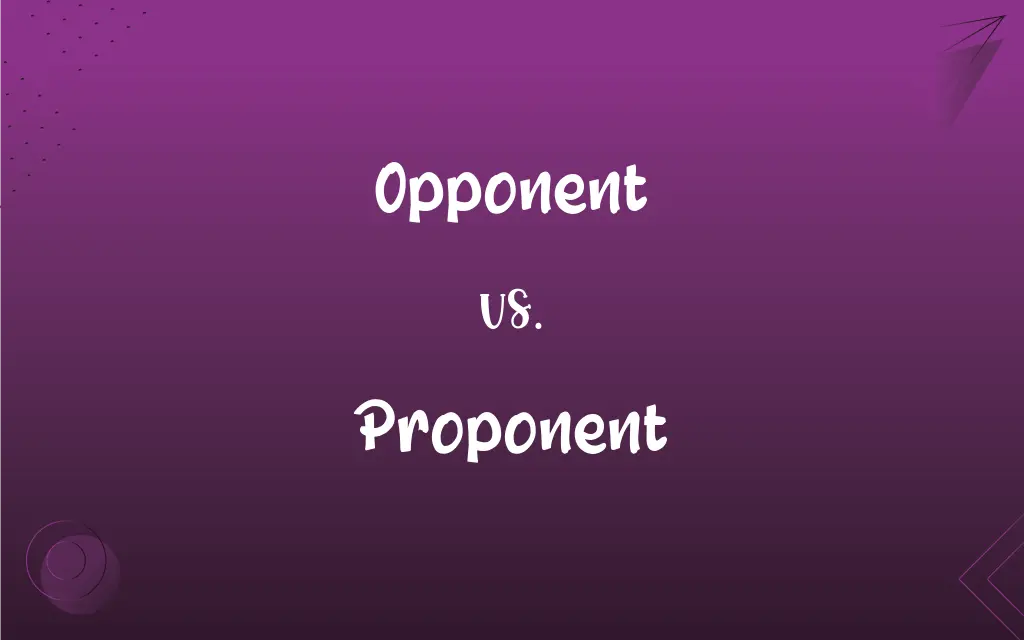Opponent vs. Proponent: What's the Difference?
Edited by Janet White || By Harlon Moss || Published on January 12, 2024
Opponent is a person who opposes or disagrees with something. Proponent is a supporter or advocate of an idea or cause.

Key Differences
An opponent is someone who actively disagrees with or resists a particular idea, policy, or approach. In contrast, a proponent is a person who supports or advocates for a specific idea, policy, or method, often speaking out in its favor.
In a debate, an opponent argues against a particular point of view, presenting counterarguments or opposing evidence. A proponent, on the other hand, defends the view, providing arguments and evidence in support of the position.
In the context of sports or games, an opponent is a competitor who is trying to win against others. Conversely, a proponent is not relevant in such competitive contexts but is more involved in supporting or promoting certain principles or activities.
An opponent can be found in various areas like politics, where they oppose policies or candidates. A proponent in politics is someone who endorses specific policies, candidates, or political ideologies.
In legal terms, an opponent could be a lawyer who represents the opposing side in a court case. As for a proponent, they might be a legal advocate who argues in favor of a particular interpretation of the law or a legal decision.
ADVERTISEMENT
Comparison Chart
Basic Definition
Someone who opposes or disagrees
Someone who supports or advocates
Context of Use
Debates, sports, legal cases, politics
Advocacy, politics, ideological discussions
Role
Arguing against, competing
Supporting, promoting
Example Context
Opposing team in a game, rival in politics
Advocate for a cause, supporter of a policy
Interaction with Ideas
Contesting or challenging ideas
Endorsing or promoting ideas
ADVERTISEMENT
Opponent and Proponent Definitions
Opponent
Rival in Competition.
She faced a tough opponent in the championship game.
Proponent
Supporter of a Policy.
He was a strong proponent of educational reform.
Opponent
Debate Adversary.
In the debate, his opponent argued against his proposal.
Proponent
Endorser of an Idea.
The scientist became a proponent of the new theory.
Opponent
Ideological Disagreer.
As an opponent of the new policy, he voiced his concerns publicly.
Proponent
Advocate for a Cause.
As a proponent of renewable energy, she spoke at the conference.
Opponent
Legal Challenger.
The lawyer prepared to face a skilled opponent in court.
Proponent
Backer of a Concept.
As a proponent of sustainable living, he implemented eco-friendly practices in his community.
Opponent
Political Rival.
The senator's primary opponent campaigned on a very different platform.
Proponent
Champion of a Movement.
She was known as a proponent of women's rights.
Opponent
One that opposes another or others, as in a battle, contest, or debate
A political opponent.
Proponent
One who argues in support of something; an advocate.
Opponent
One who is hostile to an idea or cause
An opponent of gun control.
Proponent
One who supports something; an advocate
FAQs
Can someone be both an opponent and a proponent?
Yes, a person can be an opponent of one idea while being a proponent of another.
Where are proponents typically found?
Proponents are often involved in advocacy, politics, and supporting various causes or policies.
In what contexts do we commonly find opponents?
Opponents are common in sports, debates, politics, and legal battles.
Can a proponent be neutral?
Generally, proponents are not neutral since they actively support or advocate for something.
What is a proponent?
A proponent is a person who supports, advocates, or promotes a certain idea, policy, or cause.
Do opponents always actively fight against something?
While opponents often actively resist or argue against something, they can also passively disagree.
Can someone be an unwilling opponent?
Yes, circumstances can sometimes force a person into the role of an opponent.
What is an opponent?
An opponent is someone who opposes or disagrees with a particular viewpoint, idea, or person.
Are opponents always negative?
Not necessarily; opponents can simply have a different perspective or constructive criticism.
Is being an opponent always related to confrontation?
Not always; opposition can also be expressed through peaceful disagreement or alternative proposals.
Do proponents need to publicly advocate for their cause?
While public advocacy is common, proponents can also support causes in more private or subtle ways.
Do proponents have to belong to specific groups or organizations?
No, individuals can be proponents independently of groups or organizations.
In a legal context, how does an opponent operate?
In legal contexts, opponents typically argue against the other party's position in court.
Can organizations be proponents?
Yes, organizations can act as proponents of causes or policies.
Are proponents always experts in what they support?
Not necessarily; they might be enthusiasts or laypersons passionate about a cause.
Can an opponent change their stance?
Yes, opponents can change their stance if persuaded or if their views evolve.
How do opponents express their disagreement?
They can use debate, written objections, protests, or constructive discussions.
Can an opponent’s views be based on misinformation?
It's possible; like anyone, opponents can hold views based on incorrect or incomplete information.
Are proponents typically activists?
Some are, but others might simply be supportive without being active in the traditional sense.
Do proponents always actively campaign for their cause?
Active campaigning is common but not mandatory; support can be shown in various ways.
About Author
Written by
Harlon MossHarlon is a seasoned quality moderator and accomplished content writer for Difference Wiki. An alumnus of the prestigious University of California, he earned his degree in Computer Science. Leveraging his academic background, Harlon brings a meticulous and informed perspective to his work, ensuring content accuracy and excellence.
Edited by
Janet WhiteJanet White has been an esteemed writer and blogger for Difference Wiki. Holding a Master's degree in Science and Medical Journalism from the prestigious Boston University, she has consistently demonstrated her expertise and passion for her field. When she's not immersed in her work, Janet relishes her time exercising, delving into a good book, and cherishing moments with friends and family.































































